Chemotherapy for Cancer: How It Works and What to Expect

chemotherapy for cancer patient
Cancer is a disease that causes abnormal cells to grow uncontrollably, damaging healthy tissues. Chemotherapy (commonly referred to as "chemo") is one of the most popular cancer treatments. But, what is chemotherapy, and how does it work? Let’s break it down in simple words
What Is Chemotherapy?
Chemotherapy is a drug that kills fast-growing cancer cells. In contrast to radiation or surgery, which target specific regions of the body, chemotherapy spreads throughout the body to eliminate cancer cells that may have spread.
How Does Chemo Work?
Chemotherapy drugs stop cancer cells from growing and multiplying by limiting their ability to divide. This helps shrink tumours, making them easier to remove with surgery or treat with radiation. After surgery, chemo can kill any remaining cancer cells to prevent the cancer from coming back. In advanced cases, it can also help control symptoms, ease pain, and slow the spread of the disease.
Chemotherapy works in various ways to fight cancer. First, it stops cancer from multiplying by inhibiting cell division, preventing tumours from growing larger. In some cases, chemotherapy is given before surgery or radiation, to shrink the tumour to make them easier to remove. Even after surgery, chemo plays an important role by targeting and destroying cancer cells that could lead to recurrence. For patients with advanced cancer, chemotherapy helps control symptoms, reduces pain, and slows the progression of the disease, improving quality of life.
How Is Chemotherapy Given?
Chemotherapy can be given in different ways:
- IV (Intravenous) Drip: The medicine is delivered directly into your bloodstream through a vein. This can be accomplished with a tiny needle in your arm or through a port, which is a tiny device inserted beneath your skin that attaches to a vein to facilitate therapy without the need for numerous needle sticks.
- Pills or Liquids: Some chemotherapy medications are available as liquids or pills that you can take orally at home. Although this approach is more convenient, you will still require routine check-ups with your physician to assess the effectiveness of the medication.
- Injections: The chemo drug is given as a shot, usually in the arm, thigh, or just under the skin. This method is quick.
- Topical Creams: Chemotherapy is applied directly to the diseased area as a cream or ointment for certain types of skin cancer. This makes it possible for the medication to target the cancer while having less of an impact on the body as a whole.
Common Side Effects of Chemotherapy
Chemotherapy can have adverse effects since it affects rapidly growing cells, not only cancer cells. Some of the most common side effects faced during treatment are:
- Fatigue: Chemotherapy attacks rapidly growing cells, including healthy cells like those in the bone marrow, muscles and tissues, thus impairing the cells ability to metabolise and produce energy.
- Hair loss: Chemotherapy drugs target fast-growing cells, including hair follicles. These drugs disrupt the hair growth cycle, causing hair thinning or falling out.
- Nausea & vomiting: Chemotherapy irritates the lining of the stomach and triggers the release of serotonin (a neurotransmitter) in the gut, which stimulates the brain’s vomit centre.
- Low blood cell counts: Chemotherapy suppresses the bone marrow, where blood cells (red blood cells, white blood cells and platelets) are produced
- Mouth sores & appetite changes: Chemotherapy damages the rapidly dividing cells in the mouth and digestive tract, leading to painful ulcers. Taste buds may also be affected, altering taste and reducing appetite.
Does chemo always work?
Chemotherapy is effective for many types of cancer, but the success of this treatment depends on the cancer type and stage, as some cancers respond better than others.The patient’s overall health is also a determining factor as younger and healthier patients tolerate it betterLastly, the effectiveness of this treatment also depends on whether it is being taken in combination with other treatments, as sometimes, chemo works better with surgery, radiation, and immunotherapy.
Although chemotherapy is an effective treatment for cancer, it can be harmful to the body. Millions of people have successfully received chemotherapy and recovered, despite the difficult side effects. If you or a loved one is starting chemo, stay positive, follow medical advice, and take it one day at a time. Newer treatments and supportive care are making chemo more manageable than ever before.












